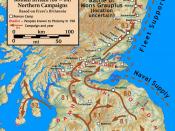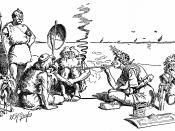Reasons for the first invasion of Britain in 55 BC
The planning stages of the invasion of Britain by Caesar in 55 BC are believed by historians to date back to 56 BC and possibly even 57 BC. He invaded because the Britons were giving aid to the Gauls and hence obstructing Caesar's efforts to defeat them: "omnibus fere Gallicis bellis hostibus nostris inde subministrata auxilia intellegebat" . This, however, was not the only reason - no other Roman military leader had made a successful campaign in Britain so a successful campaign would have 'dignitas' to it as well as Britain's widely renowned mineral wealth of metals such as gold, silver, iron and tin as a reward. 55 BC was the time at which an invasion became feasible and achievable.
Factors contributing towards Caesar's successes and failures in Britain
Caesar sent Caius Volusenus over to Britain to inspect the beaches and gather information about the island and find a suitable place to land.
He returned to Caesar and told him what he had discovered: "Volusenus perspectis regionibus omnibus quantum ei facultatis dari potuit, qui navi egredi ac se barbaris committere non auderet, V. die ad Caesarem revertitur quaeque ibi perspexisset renuntiat." This had a positive effect because without this information, Caesar would have had no idea where he was going. This was one of the many bits of good planning on Caesar's part seen throughout the invasion.
They arrived at Dover (>) with the enemy lining the cliffs making it impossible to land, forcing them to land further up the coast: "...atque ibi in omnibus collibus eitas hostium copias armatas conspexit. Cuius loci haec erat natura atque ita montibus angustis mare continebatur, uti ex locis superioribus in litus telum adigi posset." This had a negative effect in delaying the landing.


